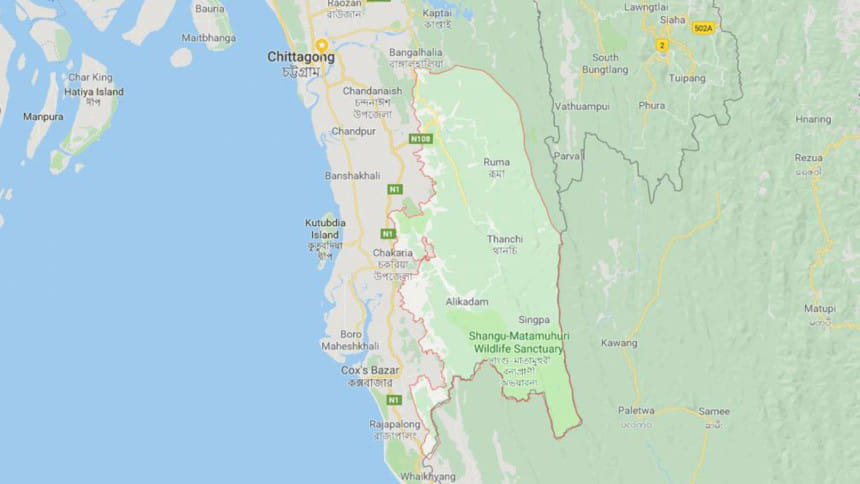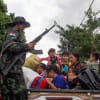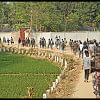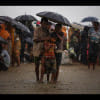Myanmar Buddhists in dire state at remote Bandarban village

The Buddhist ethnic people, who took shelter at the remote hilly region of Ruma in Bandarban, have camped there without enough food, tarpaulins or blankets, while the children are falling ill in cold weather, reported The Irrawaddy.
Medical and other aid workers were trying to reach the group, but the area they have taken refuge into is extremely difficult to reach, an aid worker told the newspaper on Wednesday.
Some 250 newly displaced Arakanese and ethnic Chin from Paletwa Township of Myanmar's Chin State were driven from their homes into Bangladesh on February 4 following fierce fighting between the Myanmar military and the Arakan Army (AA).
Win Thein, a member of Bangladesh's Bandarban District Human Rights Commission based in Ruma, told The Irrawaddy that over the weekend he met with the displaced villagers in the area about 11 km from the Remakri camp of Border Guards Bangladesh (BGB).
According to the displaced people, the Myanmar military (or Tatmadaw) torched homes in Kha Maung Wa and Kin Tha Lin villages in the upper Paletwa region last week, he said, adding that a group of 124 ethnic Chin arrived in Bandarban's Ruma region on Sunday, followed by 126 Arakanese people from various villages on the next day.
"We can't reach that region by car or boat; trekking is the only option. If we travel from Ruma it takes almost one day," Win Thein said.
According to initial reports from Ruma residents, the displaced people hiked for a couple of days to reach the Remakri region from the western Myanmar border. Relief groups could not reach Remakri by car; they had to take a boat trip from Ruma town and then make a six-hour long hike to reach Thuisa village.
They had been denied entry by local residents due to a lack of facilities there. Thus, all refugees are temporarily camping near a stream without enough food, tarpaulins or blankets, Win Thein said.
There were some 60 children in the group, including a few newborns, and the lack of warm clothing posed a threat of pneumonia among the children, he said, adding that about five of the children had been unconscious since Monday.
When he returned to Ruma town from Remakri, he sent doctors and other relief workers to rescue the children and provide the refugees with some emergency medical aid.
He explained that the climate in the area at this time of year is very cold, unlike the hilly region of Shan State in northern Myanmar, where the entire village relied on shifting cultivation and growing seasonal fruits. "All they have are machetes and bamboo baskets. That's all I could see," he said.
"I have no idea what's happening there right now because the region is out of the range of telecom networks," Win Thein said.
Another activist from Ruma, Aye Tun, who also went to meet the displaced Arakanese and Chin people in the Remakri, said arrangements were being made to transport tarpaulins to the refugees so they could put up modest temporary shelters near the stream.
He said that some local Marma people were helping by giving food to the refugees. The authorities had provided no support or humanitarian assistance to the refugees as of Wednesday.
Despite the presence of BGB personnel in the region, however, the refugees were not being driven back into Myanmar, Aye Tun said, adding that the local Marma and hill tract people of Bangladesh are familiar with the Arakanese and Chin, and willing to assist the refugees.
"Even the adults would find it difficult to stay longer without warm clothes in that dense forest area; just imagine the kids without blankets at night and sleeping on the ground," Aye Tun said.
Win Thein said he was told by refugees that Myanmar Army set some homes alight in Kin Ta Lin village, which is home to 40 families, and Kha Maung Wa village, which has 60 homes. It was unclear till Wednesday whether the entire villages had been burned to the ground, he added.
He further said the displaced Arakanese villagers had initially wanted to flee to the nearest townships, Kyauktaw and Paletwa, but as the fighting had been going on for several days, they decided to cross the Myanmar-Bangladesh border and trekked for two days. On the way to Bandarban district, they met some AA soldiers on the Myanmar border, who gave them some rice.
The Irrawaddy could not independently verify the claims of the Bangladesh-based human rights group.
AA spokesman U Khine Thuka told The Irrawaddy that the group was taking care of about 120 displaced villagers from Paletwa in its area of control on the Myanmar border. He explained that based on their own accounts, the refugees had been in a chaotic situation since the fighting broke out, with families being separated.
Win Thein urged both Myanmar and Bangladesh authorities not to block aid shipments to the region. If they fail to transport necessary medicines and food to the refugees, the children who had just moved into a cold climate from a tropical zone would be at risk of developing deadly pneumonia, he said.

 For all latest news, follow The Daily Star's Google News channel.
For all latest news, follow The Daily Star's Google News channel. 








Comments